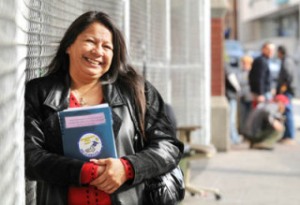
Lidia Lagarde, whose street name is "Crow," keeps a journal of her journey to recovery from addiction and homelessness. She's now been off the streets for five years.
Alcoholism, addiction and homelessness the only road she knew
Lidia Lagarde entered the world underweight and drunk.
Born with fetal alcohol syndrome, the doctors and nurses on the maternity ward had never heard such a mournful cry. And it came from this skinny, weak and premature baby.
With her tussle of jet black hair and a cry her grandmother thought sounded like a crow, her Ojibwe First Nations name became Little Crow.
Alcoholic and drug-addicted parents, 16 other brothers and sisters and an impoverished home where food was in short supply were other things she was born into.
But like many things to come in her life, that wouldn’t last.
Child welfare officials in Northern Ontario removed her and the other siblings and placed them in a foster homes.
But that too wouldn’t last.
•••••
She was moved to another foster home. And then another. And another—too many to count.
Sexual abuse and confusion about her identity—the result of being shuffled around like lost airline baggage—was the result.
“I lived with Africans, I lived with Chinese, I’ve lived with every nationality under the sun,” says Lagarde, whose long black hair and coppery skin give away her Ojibwe ancestry.
“I grew up very confused. I didn’t know who I was, what I was.”
Dreading the thought of moving to another foster home, she hit the streets of Toronto at the age of eight.
By 13 she had made her way west hitching rides, eventually finding herself on Hastings Street in Vancouver.
There Lagarde lived the high-risk life of a chronic alcoholic, drug addict and homeless woman.
Violence and a strong streak of self-preservation kept her alive on the streets for 29 years. Even the most street hardened characters feared her.
Crow—a name of her choosing—was what she was called.
Her life followed a path taken by her parents—alcoholism, addiction and homelessness. It was the only road she knew.
•••••
And Crow would still be out on the streets if she didn’t keep bumping into “angels.”
Those angels were workers at the Union Gospel Mission in New Westminster who stubbornly believed Lagarde could turn her life around, even though she didn’t.
When she came for a free meal at the UGM, she was offered more than soup and sandwiches by her angels.
Eventually they helped her realize her spirit was starving. Drugs and alcohol were her way of numbing the pain she secretly felt.
“Most alcoholic-addicts are spiritually starving because of the trauma they suffered in their lives. Most of us escape that trauma through alcohol and drugs so we don’t have to feel, we don’t have to remember, we don’t have to do anything,” she said, surveying the crowded New Westminster mission following a pancake breakfast.
As she speaks, there’s a violent outburst from a man who’s come to eat, perhaps because he’s missed the meal.
“That used to be me,” said Lagarde, who describes herself as an animal when she lived on the streets.
And although she was a handful for the UGM staff, and often came here drunk or high, they didn’t turn her away.
Today, at the age of 48, she has learned to accept herself as they did.
•••••
She carries two reminders of that acceptance wherever she goes.
One is a scrapbook with her poems, photos and other memories from her changed life. The other is her Narcotics Anonymous handbook. On the cover she’s glued a copy of the serenity prayer:
“God grant me the serenity to accept the things I cannot change,
courage to change the things I can,
and the wisdom to know the difference.”
These are the words that helped her accept herself and move on.
“I was running, running from my feelings with drugs and alcohol until I was 42. And then I started to allow myself to feel in life,” she said. “And I still feel like running, not to drugs and alcohol, but just running from the feelings.”
Born into adversity, living a life of destruction, having her own children seized because she set a poor example and steering her daughter Sophia into drugs, alcohol and the street life are all things she accepts today.
Now she’s five years clean, lives in Surrey and goes by the name Lidia Lagarde, dropping the name Crow.
“A lot of people don’t know me as Lidia Lagarde. They know me as Crow when I was on the street. The only people who knew me as Lidia Lagarde were police, court rooms, judges, lawyers, social workers and those who apprehended my children.
“That name Crow has a lot of connection to all the stuff I drank and drugged over.”
•••••
Today, she often visits the New West mission to serve soup, chat with her angels and help those who want to talk. Her home phone rings regularly from people needing advice.
Lagarde is now a role model for many wanting to escape the streets, including her daughter Sophia who is five months clean and expecting her second child.
And Lagarde now celebrates two birthdays. The first on the day she came into the world drunk and crying like a baby whose future had been foretold.
The second birthday is June 11, the day she walked into the mission weighing 82 pounds—underweight, but sober enough to realize she needed help.
“That was the date I decided to turn things around,” said Lagarde.
As she heads out the door of the mission, exchanging greetings with others, she considers how others here have come to accept her.
And it warms Lagarde’s heart.
“A lot of people come up to me now that I’ve cleaned up and say the most beautiful thing. They say they’re no longer afraid of me.
“Now they run to me.”
And she’s stopped running from herself.
mmcquillan@newwestnewsleader.com
